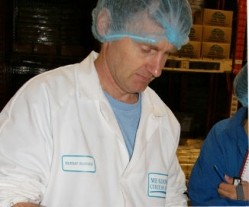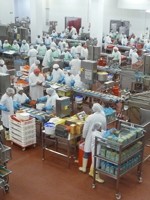Scrutiny of suppliers across the food supply network rises

Since the horsemeat scandal broke earlier this year, this interest has intensified – and not just within the meat supply chain.
According to Meadow Cheese Company, which supplies grated, shredded and processed cheese to manufacturers and the foodservice sector, ‘horsegate’ raised many companies’ concerns about the provenance of their ingredients.
“We’ve seen this year a massive increase in our customers wanting to tie down who we are buying from and right from the start of the contract they want to know where the cheese is coming from,” said Rachel McNeill, technical manager for Meadow Cheese based in Ledbury in Herefordshire, which is a subsidiary of the Irish Dairy Cheese Board.
“They want to know where our ingredients are coming from and they want that written down on a spec and signed off right from the start, so that we can’t go around switching suppliers without letting them know.”
But Meadow Cheese had seen an increase in the level of customer inspections even before the events of earlier this year.
BRC certificate
“We have seen quite a big increase over the past couple of years of customers coming in, whereas in the past they would have sent supplier audit questionnaires or just taken our BRC [British Retail Consortium] certificate. Now the BRC certificate is just seen as the first step,” said McNeill.
“It’s not that they don’t trust it [BRC Certificate] but maybe they just want that extra bit of security. They’ve been to the site and they know what we do. And for us it is quite useful because we get to share knowledge with the auditors.”
McNeill welcomed this increased scrutiny as she claimed it enabled Meadow Cheese to “build long-term relationships” with its customers.
Although all the audits that Meadow Cheese undergoes are announced in advance, McNeill said “unannounced audits”, which are increasingly prevalent for those supplying retailers, could one day become more common across the food industry. But she noted that, at present, the company’s customers had neither the intention nor resources to move down this road.
“We’d have to adapt to it,” she said. “But I think the work we are doing now on food safety culture and quality culture is going to help us in the future if that does happen. One of the drivers towards this food safety culture is that unannounced audits may occur in the future.
Traceability audits
“But we certainly get more traceability audits now. Customers are ringing us and saying we want you to do a traceability audit on this and we want all the documentation on this today. So, I suppose in a way you could call that an unannounced traceability audit.”
Meadow Cheese uses an M3 computer-based traceability system. M3 is now supplied by computer systems specialist Infor, whose product director Patrik Sjöberg will be speaking at Food Manufacture’s Food Safety Conference: What have we learnt from recent crises?, which takes place at the National Motorcycle Museum in Solihull on October 17.
“I have had experience of paper-based systems and I would say this is a bit more robust; especially when you are asked to do a trace within four hours, which BRC is now asking us to do. This system makes it is a lot easier,” said McNeill.
At the Food safety conference, BRC’s technical director David Brackston will also explain how third-party BRC Global Standard audits are likely to change in response to the horsemeat scandal.
“Going back to the horsemeat scandal, we have seen higher amounts of traceability audits and also Tradings Standards and environmental health [officers] have been doing more sampling as well,” said McNeill.















